Planters illegally bolted to an L.A. street to deter RV parking are gone. Who did it remains a mystery
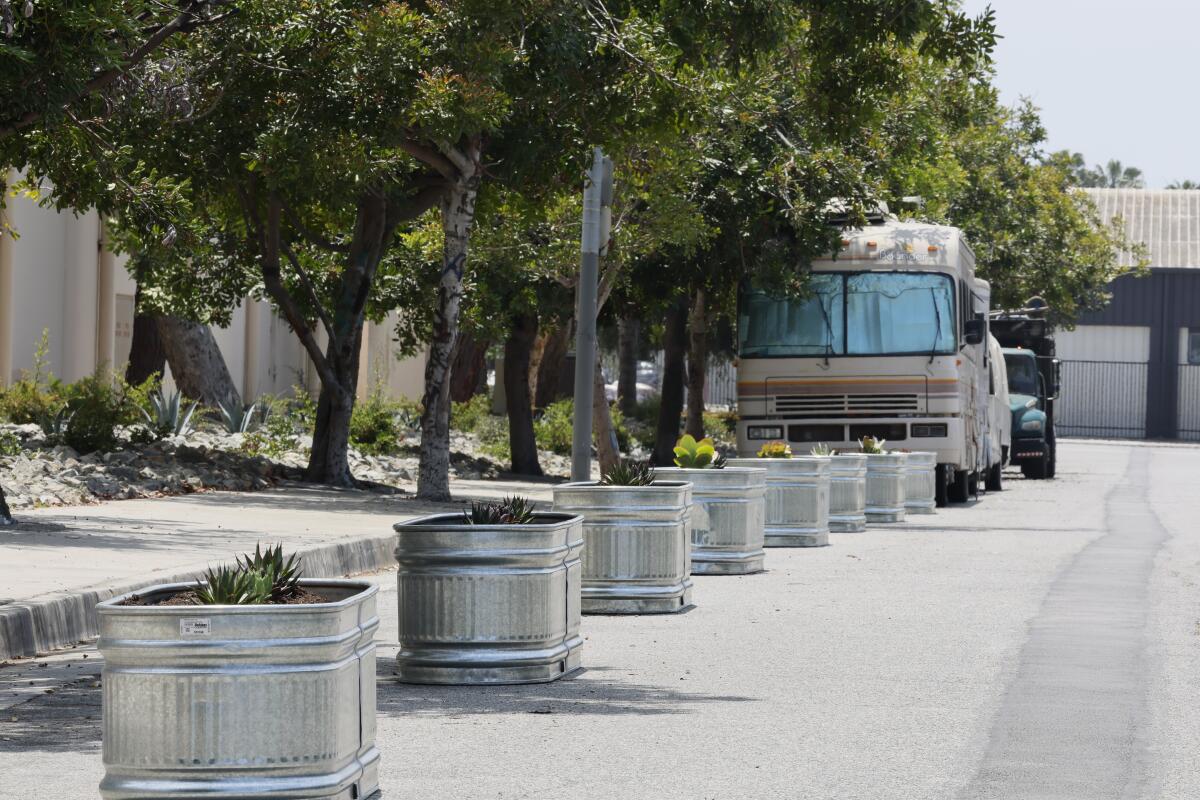
More than a dozen steel planters illegally bolted to the ground in a Playa Vista neighborhood to deter people experiencing homelessness from parking their vehicles on the street have been removed, and those responsible have been cited, according to city officials.
In recent years, the encampment of RVs, campers and other vehicles parked on Coral Tree Lane, behind a Home Depot store, has become a major concern for parents at a nearby private school. Parents say that their kids have found syringes in and around their campus and that people experiencing mental health crises often scare the elementary-school-age children.
Two men wearing orange Home Depot aprons had been seen working with a third person to bolt the metal tubs to the street.
The Los Angeles Department of Public Works cited the responsible parties for placing the planters on the city street, Jonathan Davila, communications deputy for District 11 Councilmember Traci Park’s office, said Tuesday. Less than a week after they were installed, the 18 steel tubs filled with fresh soil and green succulent plants have been removed.
But city officials have not disclosed who was cited and who was behind the operation.
It all began on May 29, when the men teamed up to bolt the metal tubs into parking spots on Coral Tree Place. They then filled the tubs with soil and plants.
A Home Depot spokesperson said a customer purchased the metal tubs and repurposed them as planters. The company would not say whether its employees helped install the planters, but video shot by homeless activists showed workers dressed as Home Depot employees installing the planters.
The tubs were installed just after Los Angeles city workers cleared the area of vehicles as part of a scheduled sanitation sweep.
Parent Vanessa Garcia, whose 6-year-old and 7-year-old children attend the nearby Westside Neighborhood School, hopes the city will take notice of the encampment now that the planters have drawn so much attention to the street.
One day, her 7-year-old son came home from school and told her that he and his classmates had found a syringe on the campus. They told their teachers. There have also been people experiencing mental health crises right outside the preschool, screaming while class was in session.
“We have a lot of parents who live near the school that would like to walk their kids through the area, but they feel that they can’t,” Garcia said. “It’s just not safe for the kids.”
When the steel planters were in place, Garcia said, she felt like the city had made a positive step to address the RV encampment.
“That’s great, I thought. We’re putting in flower planters, we’re putting in greenery. It’s great for everyone,” she said.
Days after the planters were installed, only a handful of oversize vehicles remained on the street. Handyman and artist Michael Michelangelo was among them.
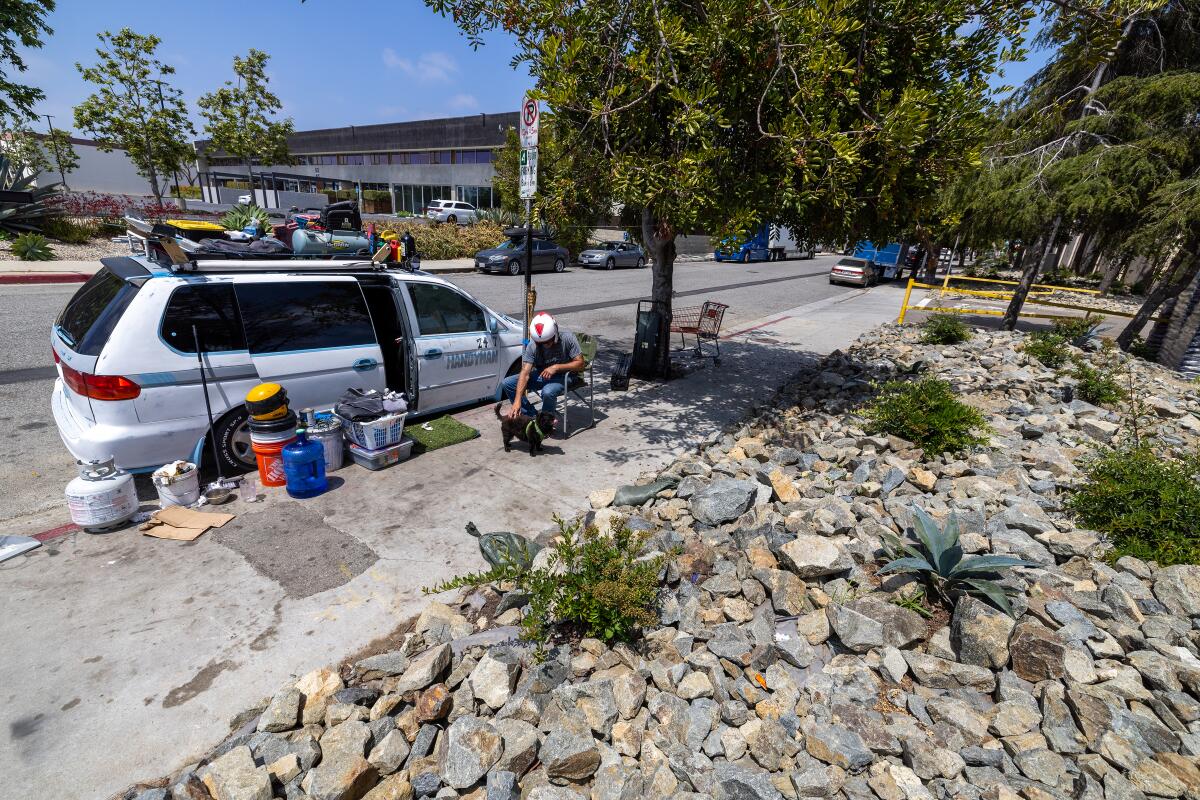
He has parked near the Home Depot for the last several months and said he’s noticed the big-box hardware store has increasingly made the property inhospitable to anyone who wants to park nearby.
“They placed these rocks, boulders really, where there used to be grass,” Michelangelo said. “I used to walk my dog from my van over there.”
Many of the residents who have been staying in their vehicles on Coral Tree Place say they chose it because it is well lighted and they don’t have to worry about residential parking restrictions. But people who work in the area also have concerns.
One man who works in the area but was not authorized to speak on behalf of his company said the encampment on Coral Tree Place has grown sharply since the beginning of the pandemic in 2020. He said there is more trash along the street, people using the street as a bathroom and graffiti on the sidewalk. Some of that graffiti includes positive affirmations and messages to other people in the homeless community.
Spencer Rosenheck’s 10-year-old son has attended Westside Neighborhood School for nearly a decade. Rosenheck said he wouldn’t mind the RV encampment if the residents made more of an effort to regulate their activities while living on the street.
The scene around the school appears unbridled, he said, with people working on car engines on the sidewalk, tampering with the street-lighting fixtures and showing signs of needing some type of a mental health intervention.
“This should not be a shantytown,” Rosenheck said.
Like other parents at the school, he welcomed the planters and applauded the person who did it.
“The parents, all of us, were thrilled to see someone go after this,” Rosenheck said.
In December 2021, parents dropping their children off at Westside Neighborhood School witnessed police standing over the body of a dead man who probably had overdosed, according to reporting from the Westside Current.
More than 14,000 people lived in some type of vehicle in Los Angeles County in 2023, including vans and RVs, according to the latest data from the county’s Homeless Services Authority. There are about 1,200 more vehicles than in the previous year and more vehicles than the county has spaces to provide for under its Safe Parking LA program.
The Los Angeles City Council voted to create new parking restrictions west of Runyon Canyon after residents complained about limited street space.
When sanitation crews cleared the area last week, homeless advocate and UCLA sociology doctoral candidate Sam Lutzker was there as part of his work, documenting the lives of people living in vehicles in Council District 11.
After the area was cleared, men wearing the signature Home Depot aprons installed the steel tubs and appeared to bolt them to the city street with power tools, according to a post from the X account Venice Justice, an advocacy group.
Lutzker, also a member of Venice Justice, approached the men and asked if they had permits to install the planters. He recorded his interaction with the men, who refused to identify themselves.
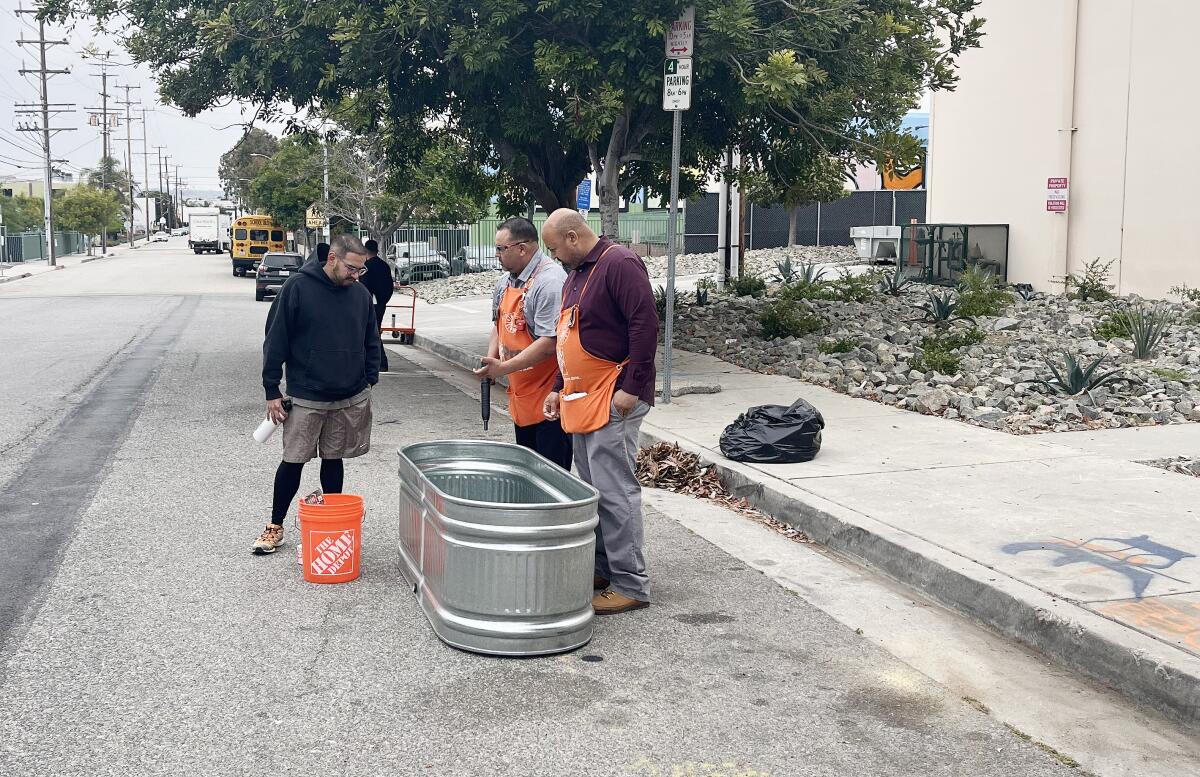
One of the men wearing a Home Depot apron told Lutzker they were “authorized by the city” to install the planters, according to video he shared with The Times.
The men installed the planters, then told the remaining vehicle dwellers on the street that they planned to install more.
Shortly after Los Angeles cleared dozens of RVs that had stationed themselves along Forest Lawn Drive, the city painted a long stretch of the curb red and banned parking in the busy street.
Homeless advocates say city sweeps coupled with citations push vehicle dwellers into neighboring districts and cities, because there are not enough resources to accommodate them. The area around the Playa Vista Home Depot is made up of business parks and the elementary school.
Park’s office said that the sanitation sweep on May 28 was part of “our continued efforts of offering housing solutions to everyone while addressing the health and safety hazards of oversize vehicle dwelling.”
Park’s office would not say whether it was aware of the operation before the planters were installed.
The issue is especially tense in Council District 11, said Venice Justice member Peggy Lee Kennedy, because vehicle dwellers find themselves being pushed from one encampment to the next.
Shortly after Los Angeles cleared dozens of RVs that had stationed themselves along Forest Lawn Drive, the city painted a long stretch of the curb red and banned parking in the busy street.
“The current process in Council District 11 is aimed at permanently removing RVs through creating parking restrictions and ‘No RV Zones’ including bollards, red curbs, planters, fences and no ‘Oversized Parking’ signs,” Kennedy said in an email.
This results in less public parking and, Lutzker said, forced some people to park behind the Playa Vista Home Depot in the first place.
“I’m stuck because I need a new transmission for my van,” said Michelangelo, the artist. “You think I want to stay here? There are opportunities elsewhere.”
More to Read
Sign up for Essential California
The most important California stories and recommendations in your inbox every morning.
You may occasionally receive promotional content from the Los Angeles Times.
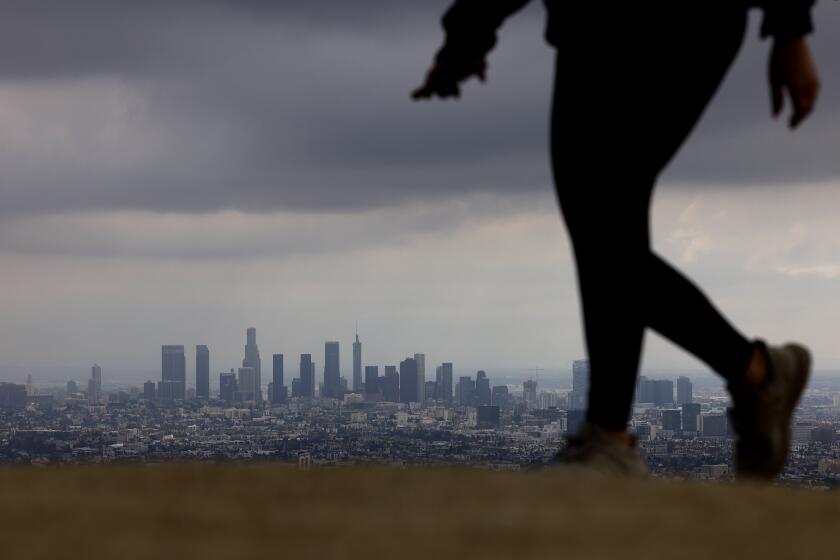
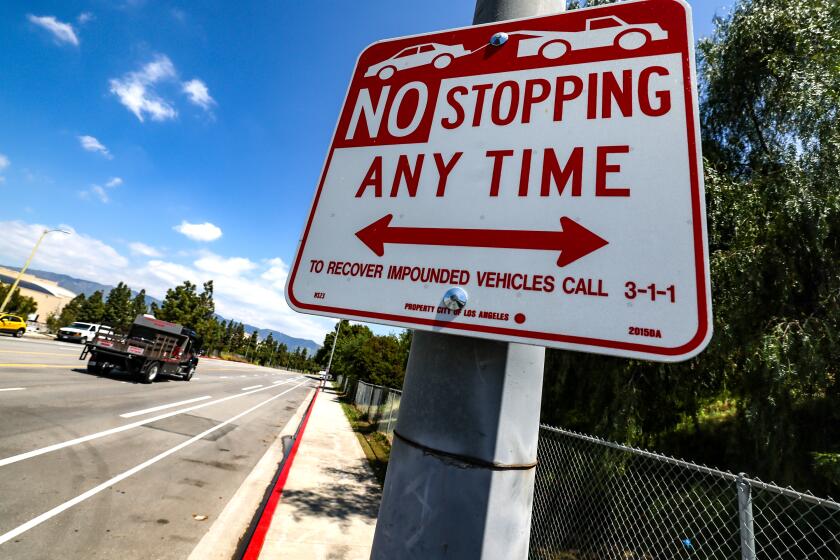

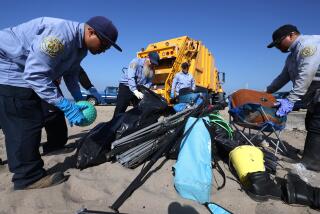
![Los Angeles, CA - May 19: Carlos Vargas, left, and Paulina Rubio, members of the harm reduction team from Homeless Outreach Program Integrated Care Systems [HOPICS], a leading homeless services and housing agency, look for drug addicts to help and pass out supplies at a homeless RV encampment along 77th St. in South Los Angeles Friday, May 19, 2023. The team hands out syringes, fentanyl test strips, overdose reversal nose spray and medication to prevent overdoses, infection and disease transmission, including the HIV virus. Fenanyl is particularly insidious because it can be found in all other drugs, especially meth and heroin. The handouts are also meant to reduce infection through broken pipes, which can cut users mouths and open them to infection. . (Allen J. Schaben / Los Angeles Times)](https://ca-times.brightspotcdn.com/dims4/default/530e2db/2147483647/strip/true/crop/3900x2608+0+34/resize/320x214!/quality/75/?url=https%3A%2F%2Fcalifornia-times-brightspot.s3.amazonaws.com%2Fe9%2F77%2F4b8bd35d4881a3edec6b945b143b%2F1298639-me-soaring-fentanyl-deaths-24-1-ajs.jpg)








